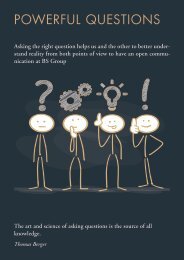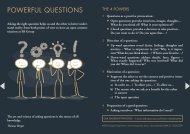Test
You also want an ePaper? Increase the reach of your titles
YUMPU automatically turns print PDFs into web optimized ePapers that Google loves.
POWERFUL QUESTIONS<br />
Asking the right question helps us and the other to better understand<br />
reality from both points of view to have an open communication<br />
at BS Group<br />
The art and science of asking questions is the source of all<br />
knowledge.<br />
Thomas Berger
THE 4 POWERS<br />
1 Questions as a positive provocation :<br />
Open questions provoke emotions, images, thoughts –<br />
What do you think of ? What is your opinion of ?<br />
Closed questions provoke a decision to take position –<br />
Do you want to do it? Do you agree that… ?<br />
2 Direction of a question :<br />
Up - ward questions reveal desire, feelings, thoughts and<br />
motives – What is important to you ? Why is it important?<br />
What do you think about… ? What is your favorite…?<br />
Down-ward questions address details, facts, figures –<br />
What exactly happened ? Who was involved ? What did<br />
you do? When did it occur ?<br />
3 Motivation of a question :<br />
Supports the other to see the context and positive intention<br />
of the one asking the question :<br />
a) In order to... / To allow you... / To allow us...<br />
b) The reason why we ask as a benefit for the other<br />
to answer<br />
c) The open question<br />
4 Preparation of a good question :<br />
Asking ourselves : ‘ What information do I need ?’<br />
OUR LEADERSHIP PRINCIPLES – I ensure and expect open and honest communication<br />
© BS Group / Living Vision · www.livingvision.swiss · documentation ( MA LS 150010 EN )
ATTENTIVE LISTENING<br />
In a world full of e-messages attentive listeners pay careful<br />
attention to what others have to say to them in a personal<br />
conversation to understand them fully. A true exchange of<br />
thoughts to bring BS Group forward successfully<br />
I like to listen. I have learned a great deal from listening carefully.<br />
Most people never listen.<br />
Ernest Hemingway
RULES OF ATTENTIVE LISTENING<br />
1 Pay full attention to understand<br />
➔ be there & stay silent ( shut down your e - devices )<br />
2 Encourage responses<br />
➔ smile & nod<br />
3 Respect the other<br />
➔ eye contact & appropriate body language<br />
4 Wait for the final message<br />
➔ at least wait for the 2 nd and 3 rd response to your<br />
question<br />
OUR LEADERSHIP PRINCIPLES – I ensure and expect open and honest communication<br />
© BS Group / Living Vision · www.livingvision.swiss · documentation ( MA LS 150020 EN )
PERCEPTION & REALITY<br />
All our actions are driven by our own images. How do we see<br />
the world through our own glasses ?<br />
There are things known and there are things unknown, and in<br />
between are the doors of perception.<br />
Aldous Huxley
WHERE DO OUR PERCEPTIONS<br />
COME FROM<br />
Cultural background<br />
Education<br />
Environment<br />
Experiences<br />
Social Media<br />
Peers<br />
Upbringing<br />
HOW TO DEAL WITH OUR PERCEPTIONS<br />
Our Perception ≠ ‚The Reality‘<br />
1 Do I have the means to change reality ➔ can I ?<br />
2 Do I have the ability to adapt my perception ➔ will I ?<br />
3 Shall I enter a conflict ➔ should I ?<br />
Which of the 3 options helps me to learn more about how to<br />
deal best with ‚reality‘ ?<br />
FLEXIBILITY TO ADAPT – I see challenges and restrictions as opportunities<br />
© BS Group / Living Vision · www.livingvision.swiss · documentation ( MA LS 150030 EN )
APPRECIATION<br />
Recognition for a special effort leads to higher motivation to<br />
achieve or even overachieve our BS Group targets<br />
Employees who report receiving recognition and praise within<br />
the last seven days show increased productivity, get higher<br />
scores from customers, and have better safety records. They‘re<br />
just more engaged at work.<br />
Tom Rath
WHAT ARE THE CHARACTERISTICS OF<br />
REAL APPRECIATION<br />
For Free : Not linked to any other requests<br />
Personal : One - to - one if ever possible<br />
Perspective : Considering the other‘s perception<br />
Sincere : From the bottom of your heart<br />
Specific : Highlighting the special effort<br />
Timely : Immediately upon realization<br />
OUR DAILY LEADERSHIP ROUTINE<br />
1 Who deserves an appreciation ?<br />
2 What was the special effort ?<br />
3 Whom do I have to praise today ?<br />
OUR LEADERSHIP PRINCIPLES – I reward and celebrate success<br />
© BS Group / Living Vision · www.livingvision.swiss · documentation ( MA LS 150040 EN )
DEALING WITH STRESS<br />
Thinking about all unfinished business causes stress<br />
The greatest weapon against stress is our ability to choose one<br />
thought over another.<br />
William James
WHAT ARE THE 3 MAIN SOURCES OF STRESS<br />
1 My own assumptions :<br />
Pitfall :<br />
We always observe and make constant interpretations<br />
(often negative ones)<br />
➔ Solution : Prevent interpretations by reaching out to<br />
others asking questions to clarify the situation<br />
2 My own fixed images :<br />
Pitfall : We are stuck with our own opinion – It is so !<br />
➔ Solution : Get out of your fixed image by asking others<br />
how they see it<br />
3 My own identifications :<br />
Pitfall :<br />
We cannot make a difference anymore between<br />
ourselves and our work, hobby, function, etc.<br />
➔ Solution : Instead of taking things personal, ask yourself<br />
what you can do about it - From identification<br />
to commitment<br />
Flexibility to adapt – I see challenges and restrictions as opportunities<br />
© BS Group / Living Vision · www.livingvision.swiss · documentation ( MA LS 150080 EN )
EMPOWERING PEOPLE<br />
Empowered people find their own solutions for their challenges<br />
at BS Group<br />
You have to enable and empower people to make decisions independent<br />
of you. As I‘ve learned, each person on a team is an<br />
extension of your leadership ; if they feel empowered by you they<br />
will magnify your power to lead.<br />
Tom Ridge
Benefits of Empowerment<br />
Better ideas<br />
Efficient solutions<br />
Full buy - in<br />
Higher commitment<br />
Personal & professional development<br />
Time saving<br />
Empowering Questions<br />
What is your suggestion ?<br />
How would you solve it ?<br />
What is your idea ?<br />
How would you go about it ?<br />
What is your proposal ?<br />
Levels of Empowerment<br />
Level Objective / What Path / How Role of Manager<br />
1 Manager Manager Teacher<br />
2 Manager Direct Report / Manager Mentor<br />
3 Manager Direct Report Coach<br />
4 Direct Report / Manager Direct Report Facilitator<br />
Our Leadership Principles – I give trust and responsibility<br />
© BS Group / Living Vision · www.livingvision.swiss · documentation ( MA LS 150090 EN )
Decision Making<br />
Clear decisions lead to successful implementation of our<br />
BS Group strategy<br />
Stay committed to your decision, but stay flexible in your approach.<br />
Tony Robbins
Decision Making Process:<br />
3 Key Phases<br />
1 Preparation :<br />
Involvement of people concerned<br />
2 Announcement :<br />
I / We have decided that ...<br />
3 Implementation:<br />
Involvement of people concerned<br />
Announcing a decision<br />
Create the right context<br />
Directly to the goal : ‘I / We have decided ...’<br />
Explanation: The one concrete business reason<br />
Commitment : ‘Can I count you in ?’<br />
Empowerment : ‘What is your plan ?’<br />
Follow - up : Check every step in the implementation phase<br />
Our Leadership Principles – I give trust and responsibility<br />
© BS Group / Living Vision · www.livingvision.swiss · documentation ( MA LS 150100 EN )
APPRECIATIVE<br />
COMMUNICATION<br />
Valuing the opinion of others, even if they oppose our own,<br />
to engage in a constructive debate to find the best solutions<br />
for BS Group<br />
Those who are silent, self-effacing and attentive become the recipients<br />
of confidences.<br />
Thornton Wilder
CONSTRUCTIVE STEPS OF<br />
APPRECIATIVE COMMUNICATION<br />
What are the constructive steps after receiving an opposing opinion / a critical<br />
remark / a perceived attack ?<br />
R a t i o n a l E m o t i o n a l<br />
1 Silence : Really listen to the last word to fully understand the<br />
other person to prepare your appropriate reaction<br />
2 Affirmation : Affirm the opinion received by using the name of<br />
your interlocutor – Alternative strategies :<br />
a) Appreciate (e.g. I appreciate your input, well done,<br />
perfect input, excellent question, important remark,<br />
etc.) + wait for reaction<br />
b) Repeat exactly his/her same words + wait for reaction<br />
c) Simply say ‘Yes’ + wait for reaction<br />
3 Answer : Give a thoughtful explanation if needed + wait for<br />
reaction<br />
4 Question : The one who asks leads - Alternative strategies :<br />
a) To even better understand the subject : ‘What<br />
exactly do you mean by… ?’<br />
b) To check if your answer has been well received:<br />
‘Are you satisfied with the answer ?’<br />
If YES : Appreciate + continue with your next point<br />
If NO : Appreciate + ask ‘What else would you need ?’<br />
c) To change the subject deliberately : ‘What about… ?’<br />
BUILDING BRIDGES TO COMPLETE THE PUZZLE<br />
From the ‘Yes, but...’ attitude (defensive mode)<br />
To the ‘Yes, and + open question’ attitude (constructive debate)<br />
OUR LEADERSHIP PRINCIPLES – I ensure and expect open and honest communication<br />
© BS Group / Living Vision · www.livingvision.swiss · documentation ( MA LS 150050 EN )
SETTING PRIORITIES<br />
Making a clear difference between important and urgent matters<br />
helps us to set clear priorities for BS Group<br />
The key is not to prioritise what‘s on your schedule, but to<br />
schedule your priorities.<br />
Stephen Covey
HOW TO MAKE THE DIFFERENCE BETWEEN<br />
IMPORTANT & URGENT<br />
Important things,<br />
... are important from the beginning<br />
... always have consequences<br />
... can be planned and taken care of, if not they become<br />
important & urgent<br />
Urgent things,<br />
... are made urgent by others, and often by myself<br />
... have no consequences<br />
... are badly planned (or not at all )<br />
SETTING PRIORITIES<br />
What is your primary goal of the year ?<br />
What are your key objectives for the month in line with your<br />
yearly goal ?<br />
What needs to be achieved by the end of this week based on<br />
your monthly objectives ?<br />
Focus – I prioritise my tasks and have the courage to say No<br />
© BS Group / Living Vision · www.livingvision.swiss · documentation ( MA LS 150060 EN )
DARING TO SAY ‘NO‘<br />
To focus on the important things at BS Group, we need to<br />
be able to say ‘No’ to requests of others based on our priorities<br />
in a constructive straight forward way<br />
The ability to express the word ‘No’ is the first step to freedom.<br />
Nicolas Chamfort
HOW TO SAY ‘NO‘<br />
Appreciate their request<br />
Say ‘No’ without beating around the bush<br />
Have a friendly non - verbal body position facing towards<br />
the other<br />
Only if needed :<br />
– Give a clear and short explanation based on your<br />
business priority<br />
– Allow the other to react<br />
– Appreciate their input<br />
– Elaborate alternatives if feasible<br />
Focus – I prioritise my tasks and have the courage to say No<br />
© BS Group / Living Vision · www.livingvision.swiss · documentation ( MA LS 150070 EN )









